Reflection Report: Information Systems, Leadership, and Ethics
VerifiedAdded on 2023/01/19
|6
|1191
|49
Report
AI Summary
This report is a personal reflection on learning and progress related to information systems and leadership. It begins by discussing the application of Management Information Systems (MIS) in manufacturing, education, and medical sectors, highlighting the advantages and disadvantages of Enterprise Resource Planning (ERP) systems, with a focus on SAP R/3. The report then delves into the use of Artificial Intelligence (AI) in Business Intelligence and Knowledge Management Systems (KMS), supported by examples of how AI techniques aid decision-making. Furthermore, the report explores the ethical and legal implications of executives monitoring employees' online activities, providing the author's perspective on the issue and proposing a leadership approach that prioritizes trust and open communication over surveillance. The report concludes with a real-life example and a discussion on how to address employee issues effectively.
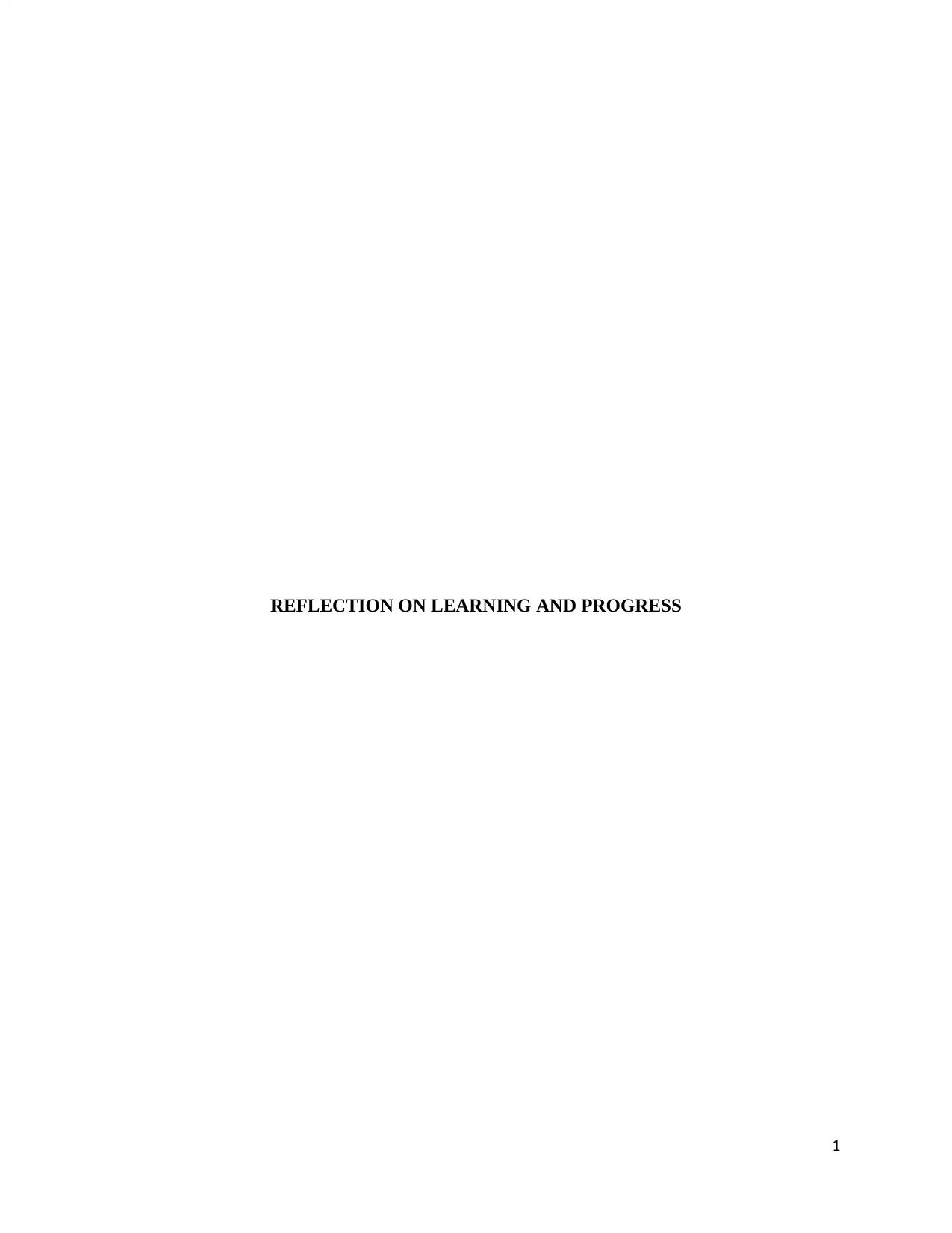
REFLECTION ON LEARNING AND PROGRESS
1
1
Paraphrase This Document
Need a fresh take? Get an instant paraphrase of this document with our AI Paraphraser
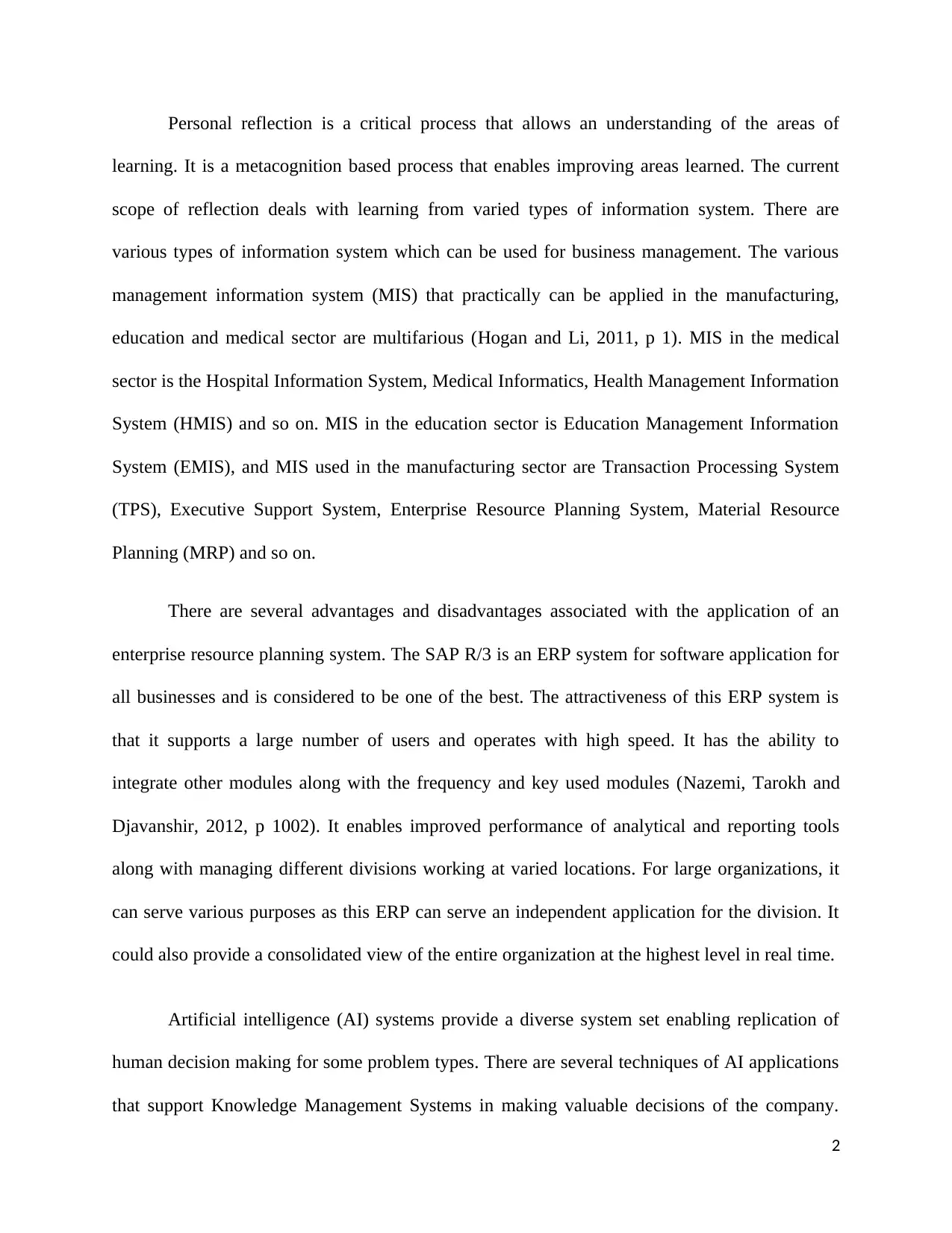
Personal reflection is a critical process that allows an understanding of the areas of
learning. It is a metacognition based process that enables improving areas learned. The current
scope of reflection deals with learning from varied types of information system. There are
various types of information system which can be used for business management. The various
management information system (MIS) that practically can be applied in the manufacturing,
education and medical sector are multifarious (Hogan and Li, 2011, p 1). MIS in the medical
sector is the Hospital Information System, Medical Informatics, Health Management Information
System (HMIS) and so on. MIS in the education sector is Education Management Information
System (EMIS), and MIS used in the manufacturing sector are Transaction Processing System
(TPS), Executive Support System, Enterprise Resource Planning System, Material Resource
Planning (MRP) and so on.
There are several advantages and disadvantages associated with the application of an
enterprise resource planning system. The SAP R/3 is an ERP system for software application for
all businesses and is considered to be one of the best. The attractiveness of this ERP system is
that it supports a large number of users and operates with high speed. It has the ability to
integrate other modules along with the frequency and key used modules (Nazemi, Tarokh and
Djavanshir, 2012, p 1002). It enables improved performance of analytical and reporting tools
along with managing different divisions working at varied locations. For large organizations, it
can serve various purposes as this ERP can serve an independent application for the division. It
could also provide a consolidated view of the entire organization at the highest level in real time.
Artificial intelligence (AI) systems provide a diverse system set enabling replication of
human decision making for some problem types. There are several techniques of AI applications
that support Knowledge Management Systems in making valuable decisions of the company.
2
learning. It is a metacognition based process that enables improving areas learned. The current
scope of reflection deals with learning from varied types of information system. There are
various types of information system which can be used for business management. The various
management information system (MIS) that practically can be applied in the manufacturing,
education and medical sector are multifarious (Hogan and Li, 2011, p 1). MIS in the medical
sector is the Hospital Information System, Medical Informatics, Health Management Information
System (HMIS) and so on. MIS in the education sector is Education Management Information
System (EMIS), and MIS used in the manufacturing sector are Transaction Processing System
(TPS), Executive Support System, Enterprise Resource Planning System, Material Resource
Planning (MRP) and so on.
There are several advantages and disadvantages associated with the application of an
enterprise resource planning system. The SAP R/3 is an ERP system for software application for
all businesses and is considered to be one of the best. The attractiveness of this ERP system is
that it supports a large number of users and operates with high speed. It has the ability to
integrate other modules along with the frequency and key used modules (Nazemi, Tarokh and
Djavanshir, 2012, p 1002). It enables improved performance of analytical and reporting tools
along with managing different divisions working at varied locations. For large organizations, it
can serve various purposes as this ERP can serve an independent application for the division. It
could also provide a consolidated view of the entire organization at the highest level in real time.
Artificial intelligence (AI) systems provide a diverse system set enabling replication of
human decision making for some problem types. There are several techniques of AI applications
that support Knowledge Management Systems in making valuable decisions of the company.
2
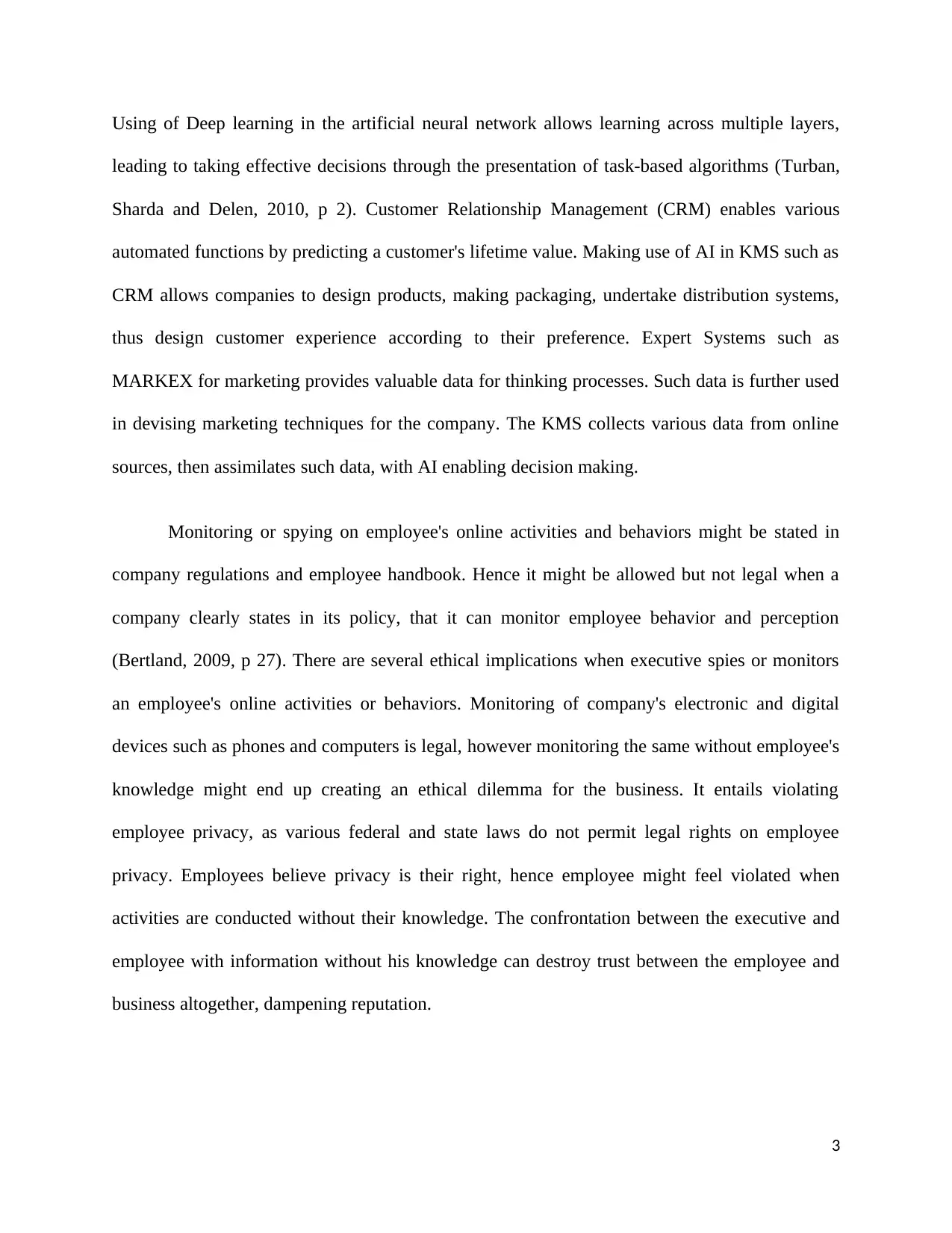
Using of Deep learning in the artificial neural network allows learning across multiple layers,
leading to taking effective decisions through the presentation of task-based algorithms (Turban,
Sharda and Delen, 2010, p 2). Customer Relationship Management (CRM) enables various
automated functions by predicting a customer's lifetime value. Making use of AI in KMS such as
CRM allows companies to design products, making packaging, undertake distribution systems,
thus design customer experience according to their preference. Expert Systems such as
MARKEX for marketing provides valuable data for thinking processes. Such data is further used
in devising marketing techniques for the company. The KMS collects various data from online
sources, then assimilates such data, with AI enabling decision making.
Monitoring or spying on employee's online activities and behaviors might be stated in
company regulations and employee handbook. Hence it might be allowed but not legal when a
company clearly states in its policy, that it can monitor employee behavior and perception
(Bertland, 2009, p 27). There are several ethical implications when executive spies or monitors
an employee's online activities or behaviors. Monitoring of company's electronic and digital
devices such as phones and computers is legal, however monitoring the same without employee's
knowledge might end up creating an ethical dilemma for the business. It entails violating
employee privacy, as various federal and state laws do not permit legal rights on employee
privacy. Employees believe privacy is their right, hence employee might feel violated when
activities are conducted without their knowledge. The confrontation between the executive and
employee with information without his knowledge can destroy trust between the employee and
business altogether, dampening reputation.
3
leading to taking effective decisions through the presentation of task-based algorithms (Turban,
Sharda and Delen, 2010, p 2). Customer Relationship Management (CRM) enables various
automated functions by predicting a customer's lifetime value. Making use of AI in KMS such as
CRM allows companies to design products, making packaging, undertake distribution systems,
thus design customer experience according to their preference. Expert Systems such as
MARKEX for marketing provides valuable data for thinking processes. Such data is further used
in devising marketing techniques for the company. The KMS collects various data from online
sources, then assimilates such data, with AI enabling decision making.
Monitoring or spying on employee's online activities and behaviors might be stated in
company regulations and employee handbook. Hence it might be allowed but not legal when a
company clearly states in its policy, that it can monitor employee behavior and perception
(Bertland, 2009, p 27). There are several ethical implications when executive spies or monitors
an employee's online activities or behaviors. Monitoring of company's electronic and digital
devices such as phones and computers is legal, however monitoring the same without employee's
knowledge might end up creating an ethical dilemma for the business. It entails violating
employee privacy, as various federal and state laws do not permit legal rights on employee
privacy. Employees believe privacy is their right, hence employee might feel violated when
activities are conducted without their knowledge. The confrontation between the executive and
employee with information without his knowledge can destroy trust between the employee and
business altogether, dampening reputation.
3
⊘ This is a preview!⊘
Do you want full access?
Subscribe today to unlock all pages.

Trusted by 1+ million students worldwide

In case I become the leader of an organization, then I would not spy on an employee’s
online activities. As I feel viewing employees online activities at work presents an ethical
dilemma. In case employees are not aware of the monitoring then dealing with the employee
using such information can risk the loss of trust (Serenko and Bontis, 2009, p 394). The
employee along with other subordinates will lose faith in me, as the leader and will not follow
me. Eventually, I will become an ineffective leader lacking support from subordinate employees.
Only in case an employee conducts illegal activities or conducts acts of violence then it requires
calling the cops.
In a real-life example where the employee was caught up for their immoral online
behavior, was when the company failed to provide with adequate bonus. Employees were seen to
report to federal and state agencies, as well as looked for a job in online portals (Jalil, Azam, and
Rahman, 2010, p 145). They updated their stances on the social media disregarding the
company's inability to bear the burden of bonus in an economic downturn. As a leader of the
company, I would have dealt with the situation by talking out the issues with them. I would
confide the company's problem in the employees and highlight the problem due to which the
company has not been able to pay out its bonuses. This would enhance trusts and confidence
amongst employees and might deter them from immoral online behavior.
4
online activities. As I feel viewing employees online activities at work presents an ethical
dilemma. In case employees are not aware of the monitoring then dealing with the employee
using such information can risk the loss of trust (Serenko and Bontis, 2009, p 394). The
employee along with other subordinates will lose faith in me, as the leader and will not follow
me. Eventually, I will become an ineffective leader lacking support from subordinate employees.
Only in case an employee conducts illegal activities or conducts acts of violence then it requires
calling the cops.
In a real-life example where the employee was caught up for their immoral online
behavior, was when the company failed to provide with adequate bonus. Employees were seen to
report to federal and state agencies, as well as looked for a job in online portals (Jalil, Azam, and
Rahman, 2010, p 145). They updated their stances on the social media disregarding the
company's inability to bear the burden of bonus in an economic downturn. As a leader of the
company, I would have dealt with the situation by talking out the issues with them. I would
confide the company's problem in the employees and highlight the problem due to which the
company has not been able to pay out its bonuses. This would enhance trusts and confidence
amongst employees and might deter them from immoral online behavior.
4
Paraphrase This Document
Need a fresh take? Get an instant paraphrase of this document with our AI Paraphraser
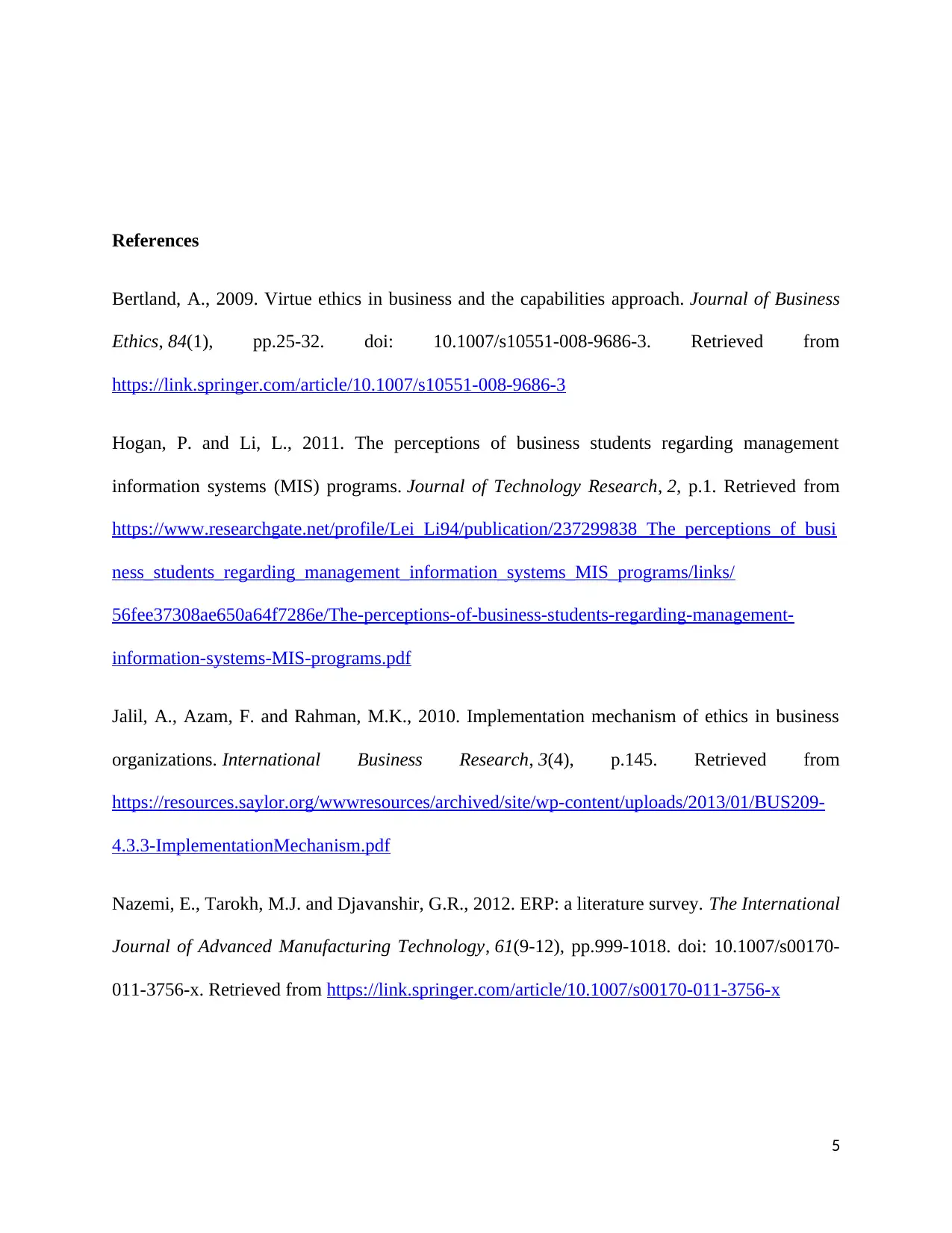
References
Bertland, A., 2009. Virtue ethics in business and the capabilities approach. Journal of Business
Ethics, 84(1), pp.25-32. doi: 10.1007/s10551-008-9686-3. Retrieved from
https://link.springer.com/article/10.1007/s10551-008-9686-3
Hogan, P. and Li, L., 2011. The perceptions of business students regarding management
information systems (MIS) programs. Journal of Technology Research, 2, p.1. Retrieved from
https://www.researchgate.net/profile/Lei_Li94/publication/237299838_The_perceptions_of_busi
ness_students_regarding_management_information_systems_MIS_programs/links/
56fee37308ae650a64f7286e/The-perceptions-of-business-students-regarding-management-
information-systems-MIS-programs.pdf
Jalil, A., Azam, F. and Rahman, M.K., 2010. Implementation mechanism of ethics in business
organizations. International Business Research, 3(4), p.145. Retrieved from
https://resources.saylor.org/wwwresources/archived/site/wp-content/uploads/2013/01/BUS209-
4.3.3-ImplementationMechanism.pdf
Nazemi, E., Tarokh, M.J. and Djavanshir, G.R., 2012. ERP: a literature survey. The International
Journal of Advanced Manufacturing Technology, 61(9-12), pp.999-1018. doi: 10.1007/s00170-
011-3756-x. Retrieved from https://link.springer.com/article/10.1007/s00170-011-3756-x
5
Bertland, A., 2009. Virtue ethics in business and the capabilities approach. Journal of Business
Ethics, 84(1), pp.25-32. doi: 10.1007/s10551-008-9686-3. Retrieved from
https://link.springer.com/article/10.1007/s10551-008-9686-3
Hogan, P. and Li, L., 2011. The perceptions of business students regarding management
information systems (MIS) programs. Journal of Technology Research, 2, p.1. Retrieved from
https://www.researchgate.net/profile/Lei_Li94/publication/237299838_The_perceptions_of_busi
ness_students_regarding_management_information_systems_MIS_programs/links/
56fee37308ae650a64f7286e/The-perceptions-of-business-students-regarding-management-
information-systems-MIS-programs.pdf
Jalil, A., Azam, F. and Rahman, M.K., 2010. Implementation mechanism of ethics in business
organizations. International Business Research, 3(4), p.145. Retrieved from
https://resources.saylor.org/wwwresources/archived/site/wp-content/uploads/2013/01/BUS209-
4.3.3-ImplementationMechanism.pdf
Nazemi, E., Tarokh, M.J. and Djavanshir, G.R., 2012. ERP: a literature survey. The International
Journal of Advanced Manufacturing Technology, 61(9-12), pp.999-1018. doi: 10.1007/s00170-
011-3756-x. Retrieved from https://link.springer.com/article/10.1007/s00170-011-3756-x
5
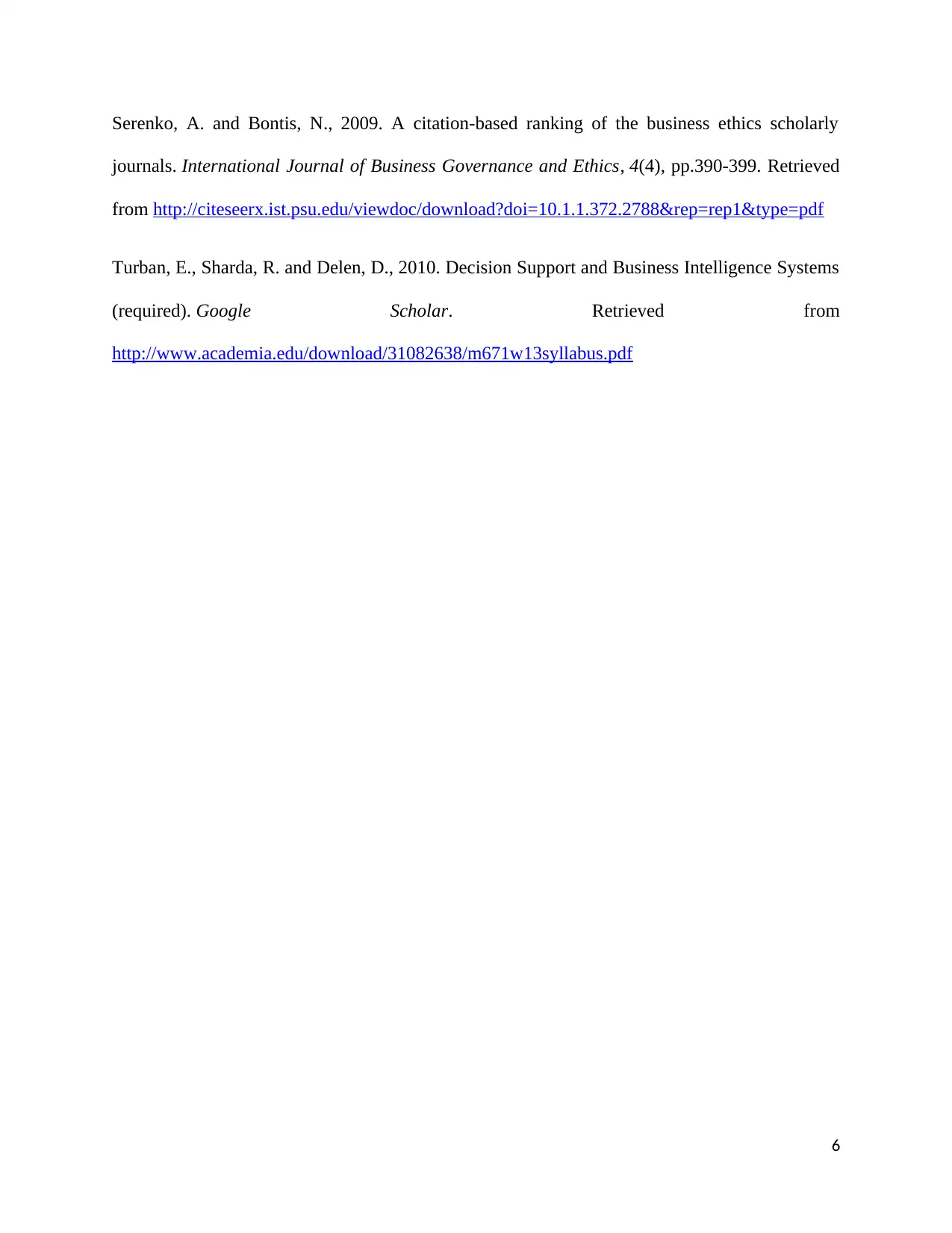
Serenko, A. and Bontis, N., 2009. A citation-based ranking of the business ethics scholarly
journals. International Journal of Business Governance and Ethics, 4(4), pp.390-399. Retrieved
from http://citeseerx.ist.psu.edu/viewdoc/download?doi=10.1.1.372.2788&rep=rep1&type=pdf
Turban, E., Sharda, R. and Delen, D., 2010. Decision Support and Business Intelligence Systems
(required). Google Scholar. Retrieved from
http://www.academia.edu/download/31082638/m671w13syllabus.pdf
6
journals. International Journal of Business Governance and Ethics, 4(4), pp.390-399. Retrieved
from http://citeseerx.ist.psu.edu/viewdoc/download?doi=10.1.1.372.2788&rep=rep1&type=pdf
Turban, E., Sharda, R. and Delen, D., 2010. Decision Support and Business Intelligence Systems
(required). Google Scholar. Retrieved from
http://www.academia.edu/download/31082638/m671w13syllabus.pdf
6
⊘ This is a preview!⊘
Do you want full access?
Subscribe today to unlock all pages.

Trusted by 1+ million students worldwide
1 out of 6
Related Documents
Your All-in-One AI-Powered Toolkit for Academic Success.
+13062052269
info@desklib.com
Available 24*7 on WhatsApp / Email
![[object Object]](/_next/static/media/star-bottom.7253800d.svg)
Unlock your academic potential
Copyright © 2020–2026 A2Z Services. All Rights Reserved. Developed and managed by ZUCOL.





